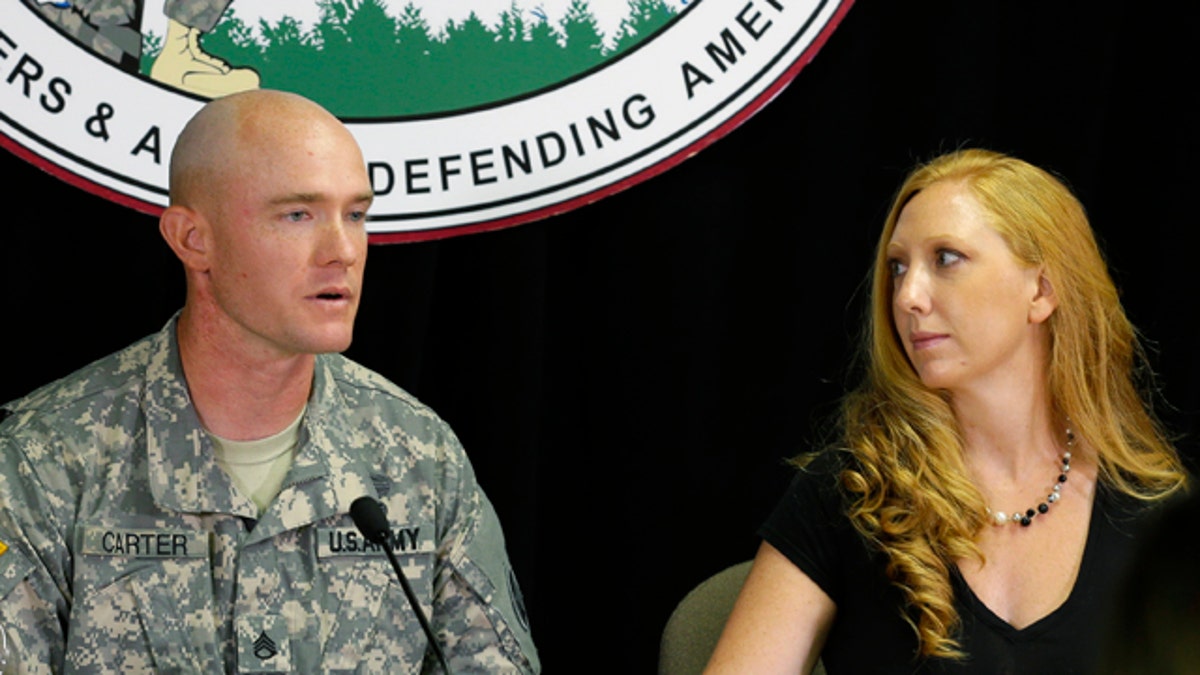
July 29, 2013: U.S. Army Staff Sgt. Ty Carter and his wife, Shannon Carter, talk to reporters at Joint Base Lewis-McChord in Washington state. (AP)
Nearly four years after a day-long firefight that killed eight of his fellow soldiers in Afghanistan, the emotion of that day remains just below the surface for Army Staff Sgt. Ty Carter, who will receive a Medal of Honor next month for his actions during that attack by Taliban fighters.
Carter, a former Marine who later enlisted in the Army and is currently assigned to the 7th Infantry Division at Joint Base Lewis-McChord, spoke to reporters Monday about the Oct. 3, 2009, battle at a mountain outpost where U.S. troops were outnumbered by about 400 Afghan fighters. In addition to those killed, 25 were injured, including Carter, who suffered hearing loss, shrapnel injuries and a concussion.
"This award is not mine alone," he said. "I am grateful for the service of all the soldiers I fought with that day."
Carter, 33, will be recognized at the White House on Aug. 26 for his actions, which included killing enemy troops, resupplying ammunition to American fighters, rendering first aid and risking his own life to save an injured soldier pinned down by a barrage of enemy fire.
"We are proud to have a soldier like him representing our Army and our nation," said Lt. Col. Joe Sowers, a spokesman for the division.
Carter, who grew up in Spokane, Wash., also has received a Purple Heart. At the time of the battle, he was a specialist assigned to the Black Knight Troop of the 3rd Squadron, 61st Cavalry Regiment out of Fort Carson, Colo.
He said he was still in his bunk when the 2009 battle started at about 6 a.m.
"That position was attacked so often that you get used to waking up to machine gun fire," he said.
Carter said he realized it was a serious attack as soon as he stepped through the door of his barracks.
"Concrete, sand, everything was spitting back at me because of the rounds coming in," he said. "I stepped back and got a running start."
He calmly detailed joining the other soldiers and resupplying them with ammunition under heavy fire.
With his wife, Shannon, holding his hand, Carter paused to regain his composure while recounting seeing two fellow soldiers, Staff Sgt. Justin Gallegos and Sgt. Vernon Martin get hit by machine gun fire. Both were killed. He described seeing another, Spc. Stephan Mace, injured by shrapnel, crawling on his elbows.
Carter said Sgt. Bradley Larson wouldn't let him immediately go to Mace because of the heavy firefighting, a decision that Carter is now certain saved his life, even though it was difficult at the time.
"It's very painful to see a good man suffer and then not be able to go to him when you know you can save him," he said, emotion choking his voice.
Later, with Larson providing cover fire, Carter was ultimately able to reach Mace, provide him first aid and get him to safety.
Carter said that when they later learned that Mace had died from his wounds, "there was a sorrow that went through the troop."
He said that if not for the actions of the other soldiers in his troop, and the reinforcements that later arrived during the 12-hour battle, "I might not be here today to speak to you."
"That day we were fighting as one team in one fight," he said.
In February, President Barack Obama bestowed the Medal of Honor on another survivor of that firefight, former Staff Sgt. Clinton Romesha. Carter, who served a second tour in Afghanistan last year, didn't attend, he said, because he was working through issues from the battle.
"I'm uncomfortable about being around the families of the fallen because I feel that I owe them so much," he said. "I feel embarrassed to be in their presence because they have lost so much."
Carter said he's been in counseling for post-traumatic stress disorder since the battle, and he hopes to help other soldiers who have the same diagnosis from their military experiences.
Shannon Carter told reporters that it's overwhelming to hear what her husband and fellow soldiers experienced.
"It's heart wrenching. It makes me cry," she said, but she has to remain strong "to help him be strong."
Ty Carter said he doesn't have any bitterness, instead choosing to focus on the fact that they were able to fend off the Afghan fighters in a situation "where an impossible situation became possible."
"That, I can't forget and I don't think anybody else can," he said.

